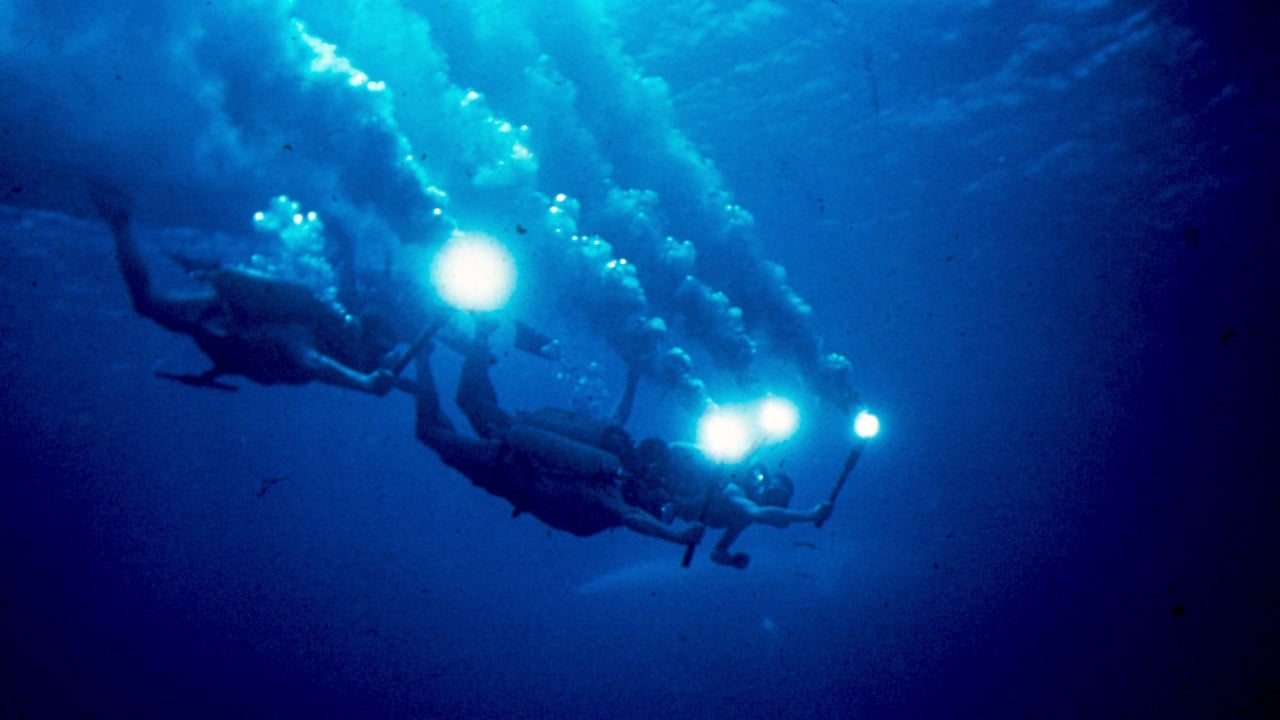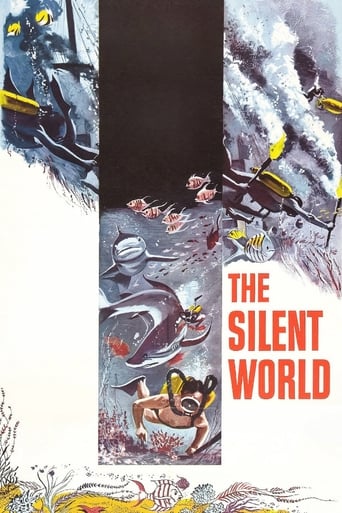Smartorhypo
Highly Overrated But Still Good
SteinMo
What a freaking movie. So many twists and turns. Absolutely intense from start to finish.
Taraparain
Tells a fascinating and unsettling true story, and does so well, without pretending to have all the answers.
Walter Sloane
Mostly, the movie is committed to the value of a good time.
MartinHafer
"The Silent World" is an Academy Award-winning documentary from directors Jacques Cousteau and Louis Malle. It helped to introduce many around the world to ocean exploration and for that we should be grateful. That being said, the film will no doubt horrify many viewers today, as sensibilities have definitely changed and the nice conservation-oriented crew of the Calypso from the 1970s and 80s is no where to be found! Instead, this earlier version of Cousteau and his team are at best irresponsible! As you see them travel the world, they commit atrocity after atrocity all in the name of science!! If you think I am being overly sensitive, try justifying them dynamiting a coral reef in order to 'get an accurate count of the fish', running over a baby whale and then harpooning and shooting it and THEN murdering the many sharks that then come to feed on the whale carcass!!! By today's standards, it's completely insane and I must say I had to speed through the shark-killing orgy as seeing crew members with axes bashing the crap out of the creatures was upsetting! You also see the crew destroying stretches of turtle grass, harassing a sea turtle, riding atop tortoises, petting fish, you name it...all the things they now tell people NEVER to do! In addition to all this senseless violence, the film also lacks a cohesive plot as well as scientific rigor. The bottom line is that the film is seriously passe now....and you'd be a lot better off watching the much more responsible and interesting reruns of "The Undersea World of Jacques Cousteau" from the 1960s and 70s.
mben111
This visually stunning masterpiece by the great undersea explorer, and co-directed by a young Louis Malle, is one of the most gorgeous films ever made. With his revolutionary equipment, Cousteau was able to capture the eerie majesty of the ocean and its mysterious inhabitants with vibrant, dazzling color. It's no wonder to me how this film won the Palm d'Or and an Oscar because it is probably the best filmed documentary ever.The focus on the new technology and the lives of the shipmates was even more fascinating than the nature, particularly the more violent scenes like the butchering of the sharks by the sailors or the dynamite in the water, used to discover the diversity of fish in the area. It is for this reason, I would guess, that this film has been forgotten and the animal rights movements of today would likely shun the film. Still, I hope for a resurgence of "The Silent World", and all Cousteau films for that matter.
Mike Roman
Both Le Monde du Silence and Le Monde Sans Soleil are remarkable documents of the underwater world. At this time, during the fifties, very little was known about coral reefs, sea creatures, and the sheer profusion of life beneath the ocean's surface. Cousteau and his crew go a long way (indeed dedicated their lives) to allowing us a glimpse of this fascinating world. Yet, there are scenes in both films which seem to pride themselves upon this human mastery over other creatures, and the destruction of their habitat. Whether sledge hammering at coral walls, or tormenting fish by enclosing them within a glass box, or dispersing chemicals in the sea as 'harmless waste', or simply killing a wide variety of creatures in the least humane way possible (appal to appeal), all in the name of learning, there comes a point when I simply switch off and think to myself: Were scientists really that dumb in the fifties? How can anyone watch this and think Cousteau (and his cronies) great pioneers of 'knowing' (science)? Of course, not all scientists were that dumb. But there are always exceptions. Recently, we could see this, at least televisually, with the Australian 'tormentor of beasts' Steve Irwin who, when his karmic credit finally ran out, was stung to death by a manta ray he was attempting to toy with for the sake of his Channel 5 program.It's curious, more than slightly ironic, that the following year the best documentary award was handed to Jerome Hill for his moving portrait of the Alsatian polymath Albert Schweitzer. Cousteau, irrespective of how he popularised the underwater world (I shall not enumerate the crimes that have been carried out under the pretext of 'scientific endeavour'), would have done well to have been acquainted with Schweitzer's work, and above all the 'ethics' that Schweitzer extolled. "A man is truly ethical only when he obeys the compulsion to help all life which he is able to assist, and shrinks from injuring anything that lives." When science (and exploration) 'shrinks' from ethics, when it just becomes an excuse to gain more knowledge and 'better understanding' (does understanding even come in degrees?) that will invariably rationalise post-factum the deeds we have done, it has already debased itself and become the way forward for a race of people who have lost their entitlement to the nomenclature 'human'.
Badge
I was looking forward to finally catching up with this old documentary and was saddened to see that despite the advances in underwater photography (in 1955), which brought the undersea life vividly to the screen, that every other aspect of the film was embarrassingly dated. I am referring specifically to the appalling behavior of the crew of the Calypso who bear scant resemblance to any naturalists and scientists we know of today, without an ounce of respect for the animals they encounter. Who in their right mind would set off dynamite in a lagoon, destroying coral reef and killing countless numbers of fish?? The only wildlife that gets off unscathed are the dolphins in the early part of the film – otherwise, everything else that gets in the path of the "explorers" is eaten, tormented, or killed outright: when they see a whale they rush on deck to harpoon it; when sharks start to work on the whale carcass, the men haul shark after shark on deck and feverishly beat them to death under the (highly scientific) rationale that "everybody hates sharks"; when they find a giant sea turtle they clutch on to it for a ride without any concern that it is struggling to the surface to breathe; when they find a group of tortoises on an island their only thoughts are to first stand on them and then use them for stools while they have lunch. Even good old Cousteau gets into the spirit of things by bringing his rifle on deck and shooting a whale in the head (well, it was probably suffering after they ran over it with the boat and then later harpooned it).These guys would be up on criminal charges if they'd made this film today. Worth watching only as a historical curio to see how unenlightened people were back then.

